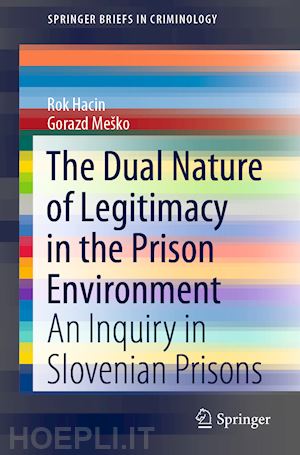
Questo prodotto usufruisce delle SPEDIZIONI GRATIS
selezionando l'opzione Corriere Veloce in fase di ordine.
Pagabile anche con Carta della cultura giovani e del merito, 18App Bonus Cultura e Carta del Docente
This book explores the dual nature of legitimacy in prison. It examines the inter-connectivity between audience perception of legitimacy (the prisoners’ perception) and the power-holders’ perception of legitimacy (the prison staff perception). It defines legitimacy in this scenario as the ability of prison workers to implement their authority in an honest, lawful, and just manner, while prisoners acknowledge their status as eligible power-holders who deserve to be obeyed and comply with their decisions.
Using mixed methods of qualitative and quantitative research, data were collected in all Slovenian prisons as well as a correctional home. The volume discusses the various factors influencing prisoner's perspective of legitimacy, and recommends avenues for further research.
This work will be of interest to researchers in criminology and criminal justice, particularly with an interest in prison and incarceration, or with an interest in Eastern Europe. It will also be of interest to those studying legitimacy within the criminal justice system more generally, and related fields such as sociology, law enforcement, and organizational psychology.
-Rosemary L. Gido, Professor Emerita, Department of Criminology and Criminal Justice, Indiana University of Pennsylvania, USA
This book studies legitimacy in prisoners and among prison staff through the lens of procedural justice theory, focusing on the context of Slovenia. The book is a must–read for scholars who are theoretically and methodologically interested in testing and applying procedural justice theory. Rarely, both prison staff and prisoners are studied in the same inquiry. This is the added value. The results have value for prison policy. This book will be of interest to scholars in criminology and criminal justice, as well as political science and public policy.
- Lieven Pauwels, Professor, Department of Criminology, Criminal Law and Social Law, Ghent University, Belgium
The now global epistemic community for the study of criminal justice and criminology requires that scholars everywhere be in frequent communication, and that they engage in the testing of concepts that are of potential universal application in democratic countries seeking to build just and efficacious public institutions. The time is here for comparative criminal justice research of high quality to be undertaken, and this book represents exemplary scholarship in this regard.
For those scholars from around the world interested in determining the potential and limitations of the theory of procedural justice as applied in the corrections setting, this book represents a “must read” for you. It presents findings from a comprehensive, mixed–methods study of how the core concepts of the theory of procedural justice can be insightfully explored within correctional institutions. The study done in the progressive, highly regarded setting of the Slovenian prison system – carried out with inmates, prison staff (corrections officers and rehabilitation services personnel) and administrators – serves as an excellent template for replication in other countries. The interpretation of findings made by two scholars of remarkable experience and profound knowledge add greatly to the
Rok Hacin, Ph.D., is an Assistant Professor of Criminology at the Faculty of Criminal Justice and Security, University of Maribor, Slovenia. Faculty of Criminal Justice and Security, University of Maribor, Slovenia. His research interest includes the legitimacy of criminal justice, penal statistics, penal policy, prison subculture, treatment of prisoners, crime mapping, and fear of crime. He has published several articles and book chapters in international and peer-reviewed publications. He has participated in a research project on Legitimacy and legality of policing, criminal justice and execution of penal sanctions (2013–2016) and a research program on Security and safety in local communities (2015–2024).
Gorazd Meško, Ph.D., is a Full Professor of Criminology and a Head of Institute of Criminal Justice and Security Research at the Faculty of Criminal Justice and Security, University of Maribor, Slovenia. He has been a President of the European Society of Criminology and an International Ambassador of the British Society of Criminology. His research interests include comparative criminology, penal policy, legitimacy of criminal justice, crime prevention, policing, environmental criminology, victimization, and cyber-crime. He has recently completed a national research project on Legitimacy and legality of policing, criminal justice and execution of penal sanctions (2013–2016) and is currently a lead researcher of a research program on Security and safety in local communities (2015–2024). He has recently co-edited a book on Trust and Legitimacy in Criminal Justice: European Perspectives (Springer, Meško and Tankebe 2015).











Il sito utilizza cookie ed altri strumenti di tracciamento che raccolgono informazioni dal dispositivo dell’utente. Oltre ai cookie tecnici ed analitici aggregati, strettamente necessari per il funzionamento di questo sito web, previo consenso dell’utente possono essere installati cookie di profilazione e marketing e cookie dei social media. Cliccando su “Accetto tutti i cookie” saranno attivate tutte le categorie di cookie. Per accettare solo deterninate categorie di cookie, cliccare invece su “Impostazioni cookie”. Chiudendo il banner o continuando a navigare saranno installati solo cookie tecnici. Per maggiori dettagli, consultare la Cookie Policy.